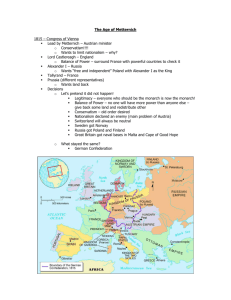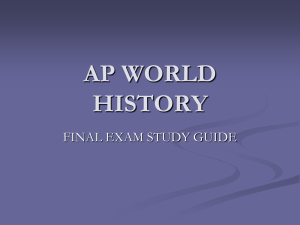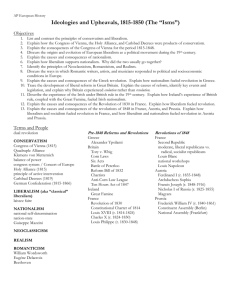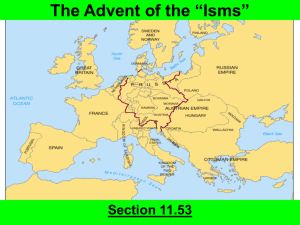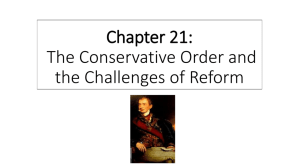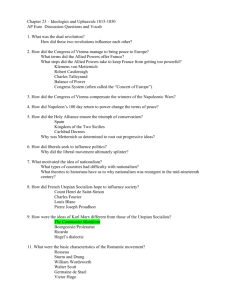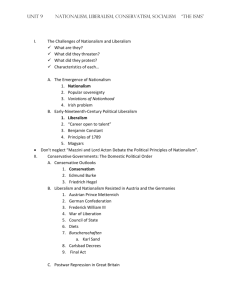AP TestBank Key 2014
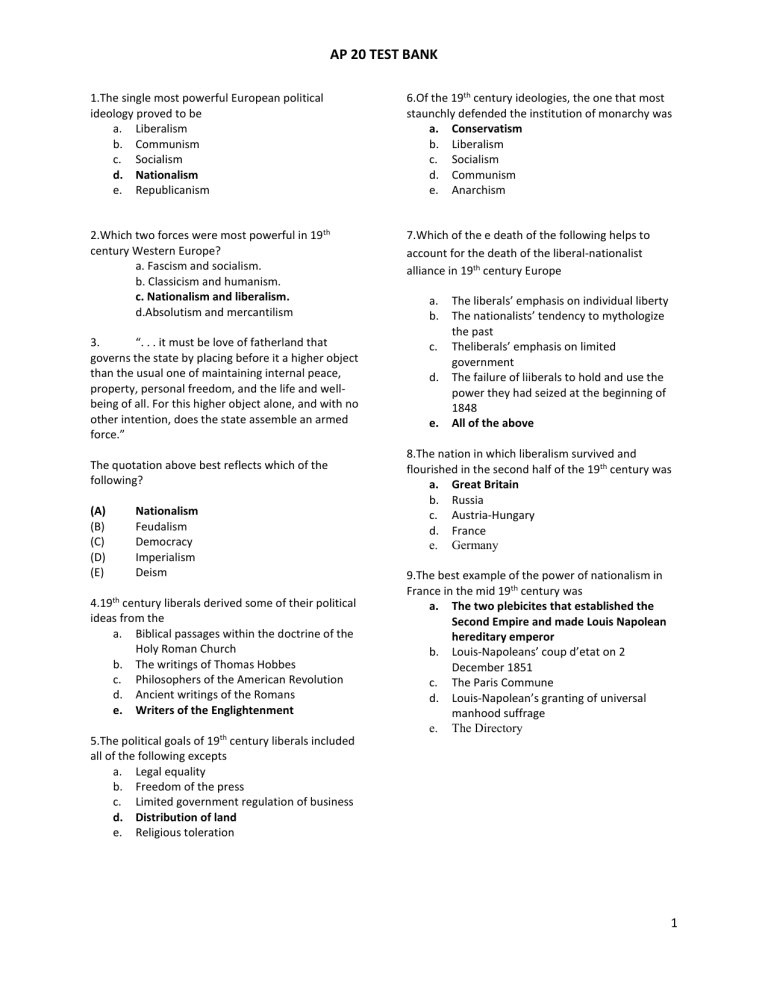
1.The single most powerful European political ideology proved to be a.
Liberalism b.
Communism c.
Socialism d.
Nationalism e.
Republicanism
AP 20 TEST BANK
6.Of the 19 th century ideologies, the one that most staunchly defended the institution of monarchy was a.
Conservatism b.
Liberalism c.
Socialism d.
Communism e.
Anarchism
2.Which two forces were most powerful in 19 th century Western Europe? a. Fascism and socialism. b. Classicism and humanism. c. Nationalism and liberalism. d.Absolutism and mercantilism
3. “. . . it must be love of fatherland that governs the state by placing before it a higher object than the usual one of maintaining internal peace, property, personal freedom, and the life and wellbeing of all. For this higher object alone, and with no other intention, does the state assemble an armed force.”
The quotation above best reflects which of the following?
(A)
(B)
Nationalism
Feudalism
(C)
(D)
(E)
Democracy
Imperialism
Deism
4.19
th century liberals derived some of their political ideas from the a.
Biblical passages within the doctrine of the
Holy Roman Church b.
The writings of Thomas Hobbes c.
Philosophers of the American Revolution d.
Ancient writings of the Romans e.
Writers of the Englightenment
5.The political goals of 19 th century liberals included all of the following excepts a.
Legal equality b.
Freedom of the press c.
Limited government regulation of business d.
Distribution of land e.
Religious toleration
7.Which of the e death of the following helps to account for the death of the liberal-nationalist alliance in 19 th century Europe a.
The liberals’ emphasis on individual liberty b.
The nationalists’ tendency to mythologize the past c.
Theliberals’ emphasis on limited government d.
The failure of liiberals to hold and use the power they had seized at the beginning of
1848 e.
All of the above
8.The nation in which liberalism survived and flourished in the second half of the 19 th century was a.
Great Britain b.
Russia c.
Austria-Hungary d.
France e.
Germany
9.The best example of the power of nationalism in
France in the mid 19 th century was a.
The two plebicites that established the
Second Empire and made Louis Napolean hereditary emperor b.
Louis-Napoleans’ coup d’etat on 2
December 1851 c.
The Paris Commune d.
Louis-Napolean’s granting of universal manhood suffrage e.
The Directory
1
AP 20 TEST BANK
10.Which of the following correctly identifies the major pillars of 19 th century conservatism? a.
Landed aristocracies, established churches and solid military b.
Labor, land, and law c.
Established churches, solid military and legitimate monarchies d.
Legitimate monarchies, landed aristocracies, and established churches e.
Solid military, established churches, and legitimate monarchies
11.In the 19 th century, conservatives a.
Argued that the governments should not interfere with the natural tendencies of the economy b.
Emphasized the development of sentiment and emotion c.
Favored constitutional monarchy d.
Supported the privileges of the aristocracy and clergy e.
Espoused utilitarianism
12.Which of the following is NOT true of 19 th century liberalism? a.
It asserted that the task of government was to promote individual liberty b.
It opposed government intervention in the economy c.
It supported the privileges of the clergy d.
It believed in the existence of natural laws that governed human behavior e.
It drew its support primarily from the middle classes
13.The strongest conservative element in 19 th century nationalism was a.
the desire for a republican form of government b.
its emphasis on the concept of natural borders c.
its desire to resist the rule of traditional aristocratic dynasties d.
its belief in the value of historical traditions e.
its belief that political sovereignty rested with the people
14.Conservatism opposed “constitutionalism because they a.
were monarchists b.
believed that constitutions ignored reality c.
respected tradition d.
wanted to hold power e. believed a government should protect private property
15.The ideology, an inheritor of the ideals of the
French Revolution, that set as its political goals in the first half of the 19 th century, freedom of press, assembly and speech, and the establishment of representative governments is a.
Socialism b.
Conservatism c.
Liberalism d.
Positivism e.
Realism
16.All of the following policies reflect the conservative nature of the British government from
1815-1825 EXCEPT a.
The Corn Laws b.
The Peterloo Massacre c.
The “Rotten Borough system” d.
The Six Acts of 1819 e.
The establishment of a modern police force
17.Between 1850 and 1914, which principle of organization became supreme by appealing to all of
Europe’s classes a.
urbanization b.
socialism c.
nationalism d.
industrialization e.internationalism
FRENCH UNITE TO PROTECT REVOLUTION
SERBIA GALVANIZES SLAVS
GERMAN UNIFICATION COMPLETED
18.The newspaper headlines above reflect attitudes associated with
(A) nihilism (B) militarism (C) Marxism (D) liberalism
(E) nationalism
2
AP 20 TEST BANK
19. Of the 19 th century ideologies, the one that most staunchly defended the institution of monarchy was a.
Conservatism b.
Liberalism c.
Socialism d.
Anarchism
25..Metternich distrusted the Burschenschaft mainly because a.
He was suspicious of liberal university professors and students b.
The organization promoted German unity and nationalism c.
It had Marxist connections d.
It was openly opposed to established authority e.Its activities were secret
20.All of the following represent a change in the democratic movement in Europe in the last three decades of the 19 th century EXCEPT a.
Liberals sought to limit government authority in social and economic affairs b.
Suffrage had expanded to include most of the male population c.
Liberals argued for government regulation of industry d.
Governments became increasingly involved in alleviating poverty e.
Industrial workers demanded a higher standard of living
26. Which of the following early nineteenth-century political figures was most closely identified with the concept of “the concert of Europe”?
(A) Castlereagh
(B) Napoleon I
(C) Talleyrand
(D) Alexander I
(E) Metternich
21.. Prince Klemens von Metternich used the
Germanic Confederation to
(A) oppose liberalism and nationalism in Central
Europe
(B) encourage the penetration of France into the
German states
(C) prevent British military domination of the
European continent
(D) aid the spread of radicalism in the German states
(E) make Prussia the dominant power among the
German states
23. Metternich, the Austrian Chancellor who dominated the Congress of Vienna, was exteremely fearful of a.
Nationalism b.
The return of the Bourbons c.
The impact of industrialization d.
Particularism among Italian states e.
Russian intentions in Europe
24.The purpose of Metternich’s Carlsbad Decrees of
1819 a.
Stifle revolutionary activity b.
Keep a close eye on German university students and professors c.
Outlaw the Burschenschaft d.
Maintain the status quo e. Do all of the above
27.Metternich would have been most in sympathy with the political philosophy of a. John Locke b. Robert Owen c. Charles Fourier d. Edmund Burke e. Giuseppe Mazzini
28.The period from the fall of Napolean in 1815 to the Revolution of 1848 is often referred to as the Age of Metternich for all the following reasons EXCEPT a.
The reactionary policies of Prince
Metternich of Austria dominated continental politics b.
Republicanism was suppressed and the nationalistic urges of most ethnic groups were denied c.
Support for the Old Order was widespread among the political elite d.
The industrial middle class was increasingly denied representation in government e.
The liberal ideas of the French
Revolution was suppressed
3
AP 20 TEST BANK
29.Metternich and other diplomats were able to accomplish all of the following as a result of the
Congress of Vienna (1814-1815) EXCEPT a.
Switzerland was recognized as a neutral nation b.
Metternich gained status internationally as a minister of Europe c.
The balance of power between nations and alliances restored d.
Italy was unified under Sardinian leadership e.
The Netherlands were reunited with
Belgium poltically
29A. The Congress of Vienna hoped to restore the European balance of power after the Wars of the Revolution and the Napoleanic Wars by a. surrounding France with strong states b. unifying all of Germany c. reestablishing the Holy Roman Empire d. unifying Italy e. giving Russia the left bank of the Rhine
30The English Corn Laws primarily benefited the a.
Working class b.
Big merchants c.
Chartists d.
Large landowners e.
clergy
31.Laissez faire economic liberalism is most compatible with the theories of a.
Karl Marx b.
Adam Smith c.
Charles Fourier d.
Louis Blanc e.
Friedrich Engels
32.Elections for the British House of Commons in the
18 th century were primarily limited to those who a.
Had significant wealth in either land or other forms of property b.
Were male and older than 21 c.
Paid taxes equivalent to three days wages d.
Could prove that in Elizabethan times their ancestors voted e.
Own significant amounts of land
33.Louis XVIII agreed to become a.
Elected president b.
Socialist monarch c.
Parliamentary monarch d.
Constitutional monarch e. Absolute monarch
34.Which would be the best description of the political situation in France from 1815 to the start of
World War I a.
A series of consisting types of governments were established and removed b.
There was a gradual but continual move toward reform and greater representation for all classes c.
There was a disintegration of republicanism d.
Imperialism replaced Bourbon despotism e.
Ceaseless despotism was relieved by brief periods of revolution
35.The Concert of Europe a.
Supported Spanish resistance to French rule b.
Oppose the Greek independence movement c.
Was unanimous in its opposition to nationalist rebellions d.
Authorized Austria to use military force to
put down Italian nationalist movements e.
Supported a rebellion for reform in Russia in 1825
36.The Concert of Europe refers to the a.
The combined effort to defeat Napoleon b.
New informal arrangement for resolving mutual foreign policy issues c.
January 1820 outbreak of the Spanish
Revolution d.
1814 restoration of the French monarchy e.
New Russian, Austrian, Prussian, and the
British quadruple alliance
37.The Congress of Vienna attempted to permanently lessen the possibility of French expansion by a.
Leaving foreign troops on French soil b.
Granting Prussia land on the left bank of the Rhine c.
Demanding that the French dismantle their military d.
Providing Russians with a corridor through
German territory to reach the French border e.
Annexing large tract of French territory
4
AP 20 TEST BANK
38.The aims of the great powers represented at the
Congress of Vienna were a.
To so weaken France that it could never threaten Europe again b.
To secure the democratic reforms on by the
French Revolution c.
To restore the traditional order and to create a new balance of power d.
To create an alliance system e.
To provide independent nation states for
Italy, Hungary, and Czechoslavakia
39.The revolt of the Greeks in 1821 against Ottoman
Empire attracted the attention of European liberals because a.
Greece was the home of democracy b.
The Greeks promised to institute universal male suffrage c.
It was the first rebellion on post-Napoleanic
Europe d.
It marked the end of the repression instituted at the Congress of Vienna e.Great Britain guaranteed Greek independence
40Greece gained their independence in 1832 with the help of a.
France, Russia , and Britain b.
German and Austria c.
The revolutionary leader Ypsilanti d.
A peaceful agreement with the Ottoman
Empire e.
Piedmont-Sardinia
41.The major powers at the Congress of Vienna included a.
Prussia, Austria, France, and Italy b.
Prussia, France, Austria, and Great Britain c.
Russia, Austria, Prussia, and Great Britain d.
Russia, Prussia, Italy, and Great Britain e.
Russian, France, Italy and great Britain
42.Toussaint L’ Ouverture led a second revolt in Haiti against France after Napoleon a.
Decided to sell Louisiana to the US b.
Reinstated slavery in French colonies c.
Moved into Spain and began the Peninsular
War d.
Eliminated colonial representation in the
National Assembly e.
Took away universal male suffrage
43.This event sparked movements for independence from European domination throughout Latin
American a.
The wars of the French Revolution, particularly those of Napoleon b.
The War of 1812 c.
The Crimean War d.
The American Revolution from Great Britain e.
The French and Indian War
44.He imposed an authoritarian constitution on Haiti and made himself Governor General for life, but he preserved formal ties with France a.
Miguel Hidalgo y Costilla b.
Simon Bolivar c.
Jose de San Martin d.
Toussaint L’Ouverture e.
King Miguel II
45.Tsar Alexander I turned away from reform and at home and abroad took the lead in suppressing a.
Feminism and Catholicism b.
Nationalism and communism c.
Communism and socialism d.
Liberalism and nationalism e.
Socialism and liberalism
46.Which is the best characterization of the status of reform in Russia from 1815 to 1914 a.
“Orthodoxy, Autocracy, Normality” was the slogan of all b.
Repeated attempts to Westernize and reform resulted in reaction c.
Gradual democratization was effected by the “Westernized” intelligentsia d.
a purge of all Western influences was effected by the “Slavophiles.” e.
There was a total suppression of all attempts to reform and modernize
47.The rulers of these ethnically diverse empires regarded nationalism within their borders as a threat a.
Britain and France b.
Germany and Austria c.
Italy and Russia d.
Russia and Austria e.
Prussia and Russia
5
AP 20 TEST BANK
48. Disturbances in Belgium, France, Germany, and
Italy between 1830 and 1832 can best be explained as manifestations of
(A) religious revivalism in the face of materialism and secularism
(B) a communist offensive against the capitalists
(C) a crusade by romantic intellectuals to overthrow classicism
(D) student campaigns for access to higher education and the professions
(E) liberal and nationalist dissatisfaction with the
Restoration political order
49.The Belgians and Dutch did not get along well as a united nation primarily because a.
The Dutch were agricultural and the
Belgians were industrial b.
The Belgians resented Dutch attempts at absolutist authority c.
There was a controversy over selecting a king d.
The British and French would not guarantee their security e.
The Dutch refused to extend their religious toleration to Belgium
50.Tsar Nicholas of Russia demonstrated his strong conservatism in all the following incidents EXCEPT a.
Brutally defeating an attempted uprising in
Poland in 1830 b.
Desiring to intervene in Belgium in 1830 c.
Sending troops to restore oder in Hungary in 1848 d.
Overrunning the Cisalpine Republic in northern Italy in Napolean’s absence e.
Causing many Poles to flee Paris and other
Western cities
51.The Declaration of Rights of the German People differed from the French Declaration of the Rights of
Man and Citizen in that the German document a.
Deinied freedom of religion to Jews b.
Addressed only the “German” people c.
Declared freedom of speech but not of assembly d.
Ignored feudal obligations e.
Avoided the issue of private property
52.In 1830 France , a.
Louis Philippe abdicated during the
“February Revolution b.
A provisional government planned for the future c.
The government opened national workshops d.
Charles X tried to apply his July Ordinances e.
Louis XVIII died
53.Delacroix’s painting Liberty Leading the People symbolically portrayed events of a.
The July Revolution of 1830 b.
The February Revolution of 1848 c.
The French Revolution d.
The “bloody June days” of 1848 e.
All of the above
54.The July Revolution of 1830 in France a.
Was a response to Charles X’s July
Ordinances b.
Produced Delacroix’s Liberty Leading the
People c.
Was led by republican forces-workers, students, and intelligencia d.
Caused Charles X to abdicate e.
Did all of the above
55.The July Ordinances of 1830 a.
Refer to the bombarding of Frankfurt by the
Prussian military b.
Led to a rebellion that forced Charles X of
France to abdicate c.
Proclaimed the Second Republic of France d.
Outlawed political meetings known as
“banquets” e.
Proclaimed Greek independence from the
Ottoman Empire
56.The Great reform Bill of 1832 granted the vote in
Great Britain to a.
Women b.
The working class c.
Middle-class men d.
Catholics e.
All men of the age of 21
58.Which of the following extended the right to vote to the adult, male middle class in Britain? a.
The Great Reform Bill of 1832 b.
The Reform Bill of1867 c.
The Reform Bill of 1884 d.
The People’s Charter e.
The Midlothian Campaign
6
AP 20 TEST BANK
7
AP 20 TEST BANK
8
